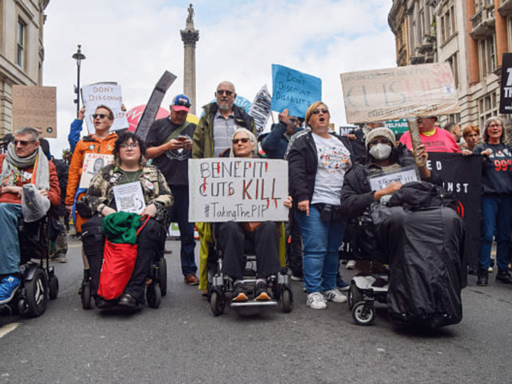Good news – it’s disability pay gap day! Hey, disabled people, how do you fancy working for absolutely nothing from now until the end of the year? This would, of course, be whilst the government and media continue to call you a lazy scrounger? Well, if you answered “fuck off, of course not”, bad news- it’s already happening.
Happy Disability Pay Gap Day!
Wednesday 12th November, is Disability Pay Gap Day. Due to the disparity in pay between disabled and non-disabled people, the Trades Union Congress (TUC) says today is the last day of the year that most disabled people will effectively be paid for working this year.
The TUC’s annual report has revealed that non-disabled people earn 15.5% more than their disabled counterparts. This amounts to £2.24 less an hour for disabled people, so someone who works 35 hours a week loses out on over £4,000 a year.
And it’s even worse news for disabled women who earn over a quarter (27.3%) less than non-disabled men. We make £3.80 less than non-disabled men an hour. Over a year, this amounts to £6,916 less than a non-disabled man. And let’s be honest, they get enough perks as it bloody is.
And as usual, it’s also worse for people of colour than it is for white people. A disabled person of colour will earn on average £3.90 less than a non-disabled white man an hour, which is £7,098 less a year. Hypocritically though, the TUC report lumps all people of colour together. Meaning we don’t get a breakdown of, say, how much less disabled women of colour or disabled men of colour make.
Disabled people trapped in vile zero-hour contracts
As well as shit pay, disabled people are also far much more likely to be in insecure work. Disabled workers are more likely than non-disabled workers to get stuck in disgusting zero-hour contracts (4.3% compared to 3.3%).
Zero-hero contracts mean that vile bosses have control over how much employees can earn. These can often be the only option for disabled people. This is because, due to the nature of their conditions, they can find it harder to get and stay in strict hourly based employment.
Low-wage contracts like these trap employees in a cycle of poverty that stops them from planning for the future. It also means that disabled people on zero-hour contracts have to take any hours they are given, despite the effect it will have on their health.
Trapping employees in despicable contracts like these also means they are less likely to challenge unacceptable behaviour – for fear that they won’t get the shifts that they need to feed themselves.
The TUC says
Zero-hour contracts hand the employer total control over workers’ hours and earning power, meaning workers never know how much they will earn each week, and their income is subject to the whims of managers.
The Labour government’s Employment Rights Bill will make it harder for employers to push zero-hour contracts on employees, but more still needs to be done to ensure disabled employees are not trapped in them by gross employers.
Disabled unemployment shows Labour don’t actually care about “supporting” us into work
Whilst zero-hour contracts are diabolical, many disabled people don’t even have that. Analysis from the TUC also shows that the unemployment rate for disabled people is now the highest it has been since before the pandemic. Disabled people also face unemployment at almost double the rate non-disabled people do.
While the pay gap has narrowed ever so slightly since last year (when it was 17.2%), it’s notably more expensive than ever to be disabled. Scope estimates that it costs disabled people an extra £1,224 a month to live. Disabled people face higher electricity bills as well as higher food bills, among other things. So the 11p we’ve gained an hour doesn’t go very far.
Despite the government constantly screaming about how they’re going to ‘support’ (read: force) disabled people into work, the Disability Pay Gap proves that their plans are nothing more than buzzword bullshit designed to appease those who think disabled people on benefits are all scroungers. It’s clear that if Labour really did care about getting disabled people into work and supporting them to stay in work, they would be doing more to narrow the disability pay gap. Instead, they’re proposing schemes that will force disabled people to work for even less than ever.
If the DWP’s Keep Britain Working plan happens, the Disability Pay Gap will widen even further – but we already know the government doesn’t actually care about supporting disabled people to live – or they wouldn’t be so hellbent on cutting benefits.
Featured image via the Canary
From Canary via this RSS feed


